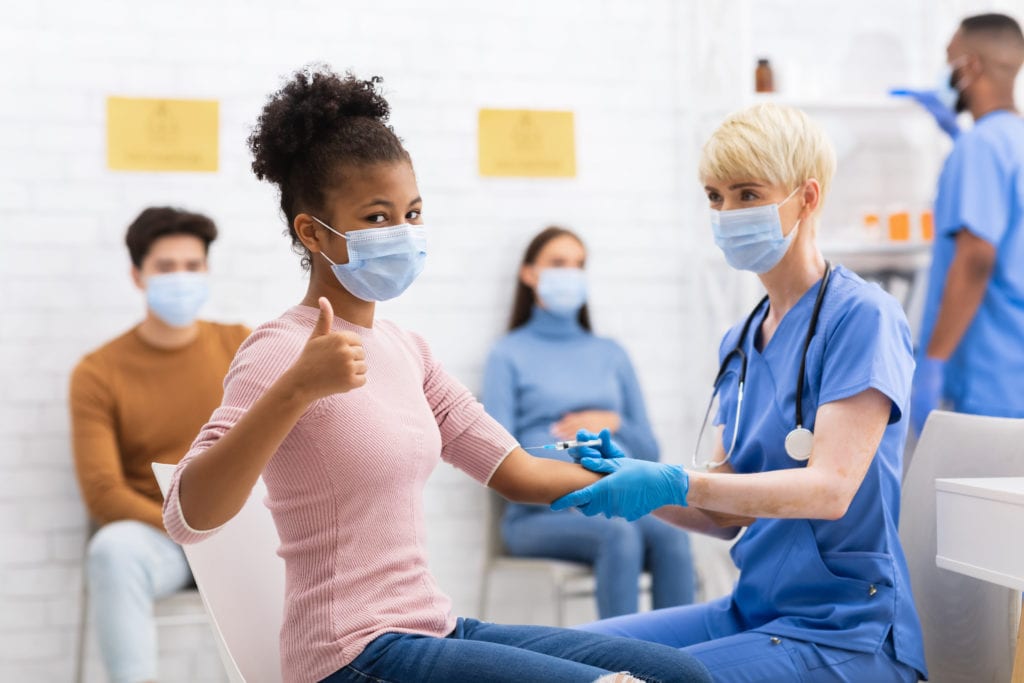Disclosure :: This post is sponsored by Baton Rouge General.
Teens and the COVID Vaccine
Teens over 16 years old have been able to get the COVID vaccine for weeks now. Their younger siblings and schoolmates, however, had to wait. That wait is now over. The FDA has expanded eligibility for the Pfizer vaccine to anyone over age 12. While many parents have been waiting for this moment to get their kids vaccinated, others are hesitant, scared or just don’t see the need. Here are some of the most common questions from parents about vaccinating their teens.
younger siblings and schoolmates, however, had to wait. That wait is now over. The FDA has expanded eligibility for the Pfizer vaccine to anyone over age 12. While many parents have been waiting for this moment to get their kids vaccinated, others are hesitant, scared or just don’t see the need. Here are some of the most common questions from parents about vaccinating their teens.
Is the vaccine safe for kids?
The Pfizer vaccine is just as safe for kids as it is for adults. Researchers have not seen any evidence that the vaccine poses different risks for kids than adults. Just like in adults, the most common side effects for teens are soreness at the injection site, fever, muscle aches or chills.
Does it work? I’ve heard of people getting COVID after being vaccinated.
It’s extremely effective. In adults, the Pfizer vaccine is 95% effective at preventing COVID, which means that while there still will be some cases in vaccinated people, they will be relatively rare. Preliminary data shows that it is 100% effective in 12-to-15-year-olds. In the vaccine clinical trial, there were zero cases of COVID-19 in the 1,100 children who received the Pfizer vaccine and 16 cases in the 1,100 children of the placebo group, according to the FDA.
If it’s rare for kids to have severe cases of COVID, why bother with the vaccine?
Fortunately, children are at a much lower risk for experiencing severe symptoms of COVID than adults. However, the odds aren’t zero. While fewer than 300 children have died of COVID in the U.S., thousands of kids have been hospitalized — including more than 3,000 who have developed a rare but dangerous inflammatory syndrome nicknamed MIS-C. MIS-C, or multisystem inflammatory syndrome in children, is a condition where different body parts become inflamed, including the heart, lungs, kidneys, brain, skin, eyes or gastrointestinal organs. Vaccinating teens and younger adults also plays a large role in stopping the spread of COVID in our families and communities, getting us closer to herd immunity.
Can we go back to normal once our entire family is vaccinated?
Though thousands of parents have been vaccinated for months now, there was still risk in traveling or attending events with their unvaccinated children. Once your household is fully vaccinated, you can feel safe getting on planes, going to church, congregating in larger groups and going maskless where it’s appropriate.
Will it be required for the kids to return to school?
It depends. Hundreds of universities across the country are requiring students to be vaccinated. But, there aren’t many cases of middle and high schools with vaccine requirements at this point. Your school will notify you if their requirements change.
If I had a bad reaction to the vaccine, will my kids have the same response?
It’s possible. If you had an allergic reaction after receiving your shot, talk with your doctor and your child’s doctor before you schedule an appointment for the vaccine.
Will it sterilize my kids?
It’s been almost a year since the first 40,000 people received the Pfizer vaccine as part of clinical trials. Since then, 134 million doses of Pfizer have been administered in the United States alone. There is no evidence that any vaccine causes infertility, and in fact, 23 women became pregnant in the earliest clinical trials for the Pfizer vaccine and thousands more women have become pregnant after the vaccine was approved for the public.
The American Academy of Pediatrics has released a list of frequently asked questions and answers here. But, if you have specific questions about your family’s health and the vaccine, talk with your doctor.



















